Hadassah
Feature
Hadassah National Convention 2014: Beating the Heat
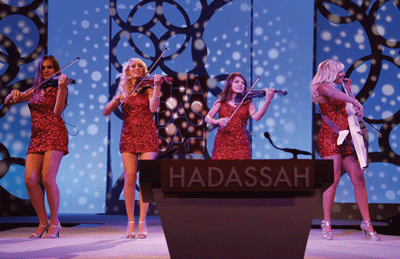
While some visitors battled triple-digit temperatures and others tried their luck in busy casinos, 750 Hadassah members and Associates descended on Las Vegas to perform mitzvot. The 97th National Convention of Hadassah, the Women’s Zionist Organization of America, held at the Venetian and Palazzo Resort Hotel and Conference Center July 21 to 23, was an occasion to express concern for the welfare of Israel and optimism for the Jewish state’s—and Hadassah’s—ability to build a more secure future.
An enthusiastic audience gathered for the convention’s opening gala on Sunday, July 21, many wearing Hadassah red. Even before the event began, women were utilizing a “Selfie Studio,” taking photos with a Henrietta Szold cutout. As if to symbolize a group of modern women working together in harmony, the event kicked off with Bella Electric Strings, an all-female rock string quartet.
“If Henrietta Szold was to look up from her iPhone…she would feel right at home,” said convention cochair Roselle Ungar. “She would see a group of strong women still caring, still committed…still striving to build a better world.”
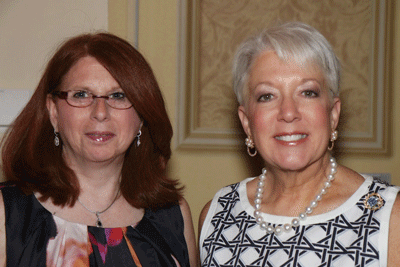
The world Hadassah works to repair has of late needed them even more. In Israel, Operation Protective Edge had begun two weeks before the start of the convention. Israeli soldiers were deployed in Gaza, while at home their families relied on the Iron Dome missile defense system for their safety. Just during the three days of meetings, the Hadassah Medical Center treated 25 injured soldiers; Hadassah youth villages housed displaced families; and many doctors, nurses and staff had been called into service by the Israel Defense Forces.
Convention-goers expressed deep concern when the Federal Aviation Administration banned United States carriers from flying to Israel because of a rocket that landed near Ben-Gurion Airport and, two days later, were relieved when the ban was lifted.
The opening ceremony energized a Hadassah generation that earlier this year worried for the future of its hospitals—and that they might not even have the opportunity to continue building the Jewish state the way their mothers had done. “The road to recovery will not be easy, but we have begun the journey and the opportunity is ours,” said Hadassah National President Marcie Natan, referring to the historic agreement reached with the Israeli government in May to secure the financial future of the Hadassah Medical Organization. “We will work and, when we can, celebrate. We will build, and we will be built. We will imagine, inspire and ignite.”
Natan shared some of hadassah’s latest accomplishments in Israel: the progress HMO doctors have made, awards and recognition received—even during a time of economic crisis. “Every Hadassah generation has been inspired to continue building, often in the face of tremendous obstacles,” she declared. “We are the bearers of that inspiration and the passion it engenders.”
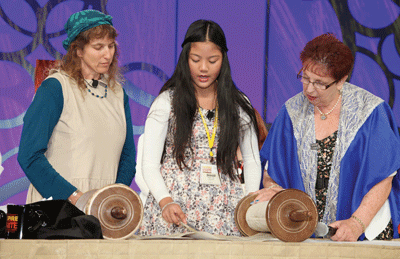
The audience of Hadassah delegates, Associates and friends was suffused with support for Israel in its time of need. “The bond that ties America to the State of Israel is one of the many factors that makes us recognize the very essence of this organization and the very meaning of the work we do,” said Janice Weinman, Hadassah’s CEO and executive director. She spoke of Hadassah’s online initiative “Defining Zionism in the 21st Century” as a way to expand the conversation.
Congresswoman Debbie Wasserman Schultz expressed support for Israel and her pride at being a Hadassah life member. “Your issues are at the top of my personal agenda,” she said, noting the values of Hadassah are what drove her to seek political office.
Randi Zuckerberg, CEO of Zuckerberg Media, creator of the online community, newsletter and book Dot Complicated and former director of market development at Facebook, urged young Jews to “stand loudly and proudly for Israel.” “When we donate, support or volunteer for organizations like [Hadassah], we invest in our future,” she said.
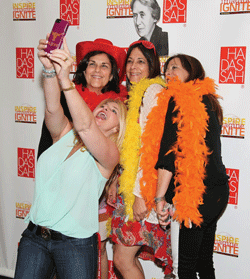
Zuckerberg described her evolving Jewish self, from her internship with Birthright Israel to the Shabbat dinner at the World Economic Forum in Davos, Switzerland, in 2010, where she sang “Yerushalayim Shel Zahav” to a sea of prominent Jews. Because her performance was captured on many cell phones, she would come to regard it as “a very public stand for Israel and Judaism.” The birth of her first child in 2011 was another turning point. Needing a united front in their Jewish observance—her husband is from a conservadox South African family and she describes herself as a “New York Jew”—Zuckerberg began increasing her commitment to Judaism while decreasing her addiction to technology and social media. She extolled the virtues of digital detox as a basic tenet of Shabbat.
On Tuesday, July 22, delegates got a chance to hear in greater detail about changes and advancements at Hadassah’s hospitals. At the HMO plenary session on “The Impact of Hadassah,” they heard about progress in medicine, from new heart disease research conducted at the Linda Joy Pollin Cardiovascular Wellness Institute to the Arab Bone Marrow Registry, the only one of its kind, supported by Hadassah Austria.
Dr. Tamar Yablonski Peretz, interim director general of HMO, praised the agreement with the Israeli government, which allows Hadassah to continue its work and “recognizes the deep appreciation and gratitude to HWZOA for the establishment of modern medicine in Israel.”
Dr. Avi Rivkind, head of the Shock Trauma Unit at Hadassah Hospital, presented statistics on HMO trauma center mortality rates that are sharply lower than in many American centers. Rivkind also spoke of HMO treating the No. 2 Hamas operative, saving his life so he could serve 58 life sentences in prison. Addressing the question of treating enemies of Israel, he said, “I think we should treat, because of our history. We are valuing life.”
A video introduced convention-goers to a family twice saved by Hadassah: Esther Israel, a cancer survivor, and her daughter, Shahar, who had developed leukemia. When seeking Shahar’s treatment, her brothers said, “Ima was cured at Hadassah, Shahar should go to Hadassah.” The audience was a sea of prideful smiles and joyful tears when they learned their hospital had saved Shahar as well.
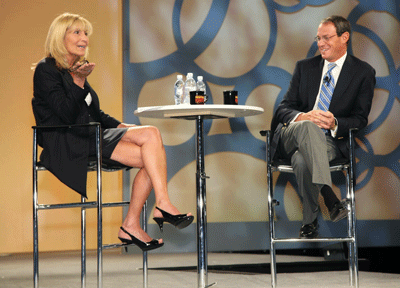
And then the scene changed from video to live action. A year after filming, Shahar, now 12, and Esther Israel made their way up the aisle of the auditorium, carrying a Torah to the sound of a shofar. The women who maintain the hospital that saved them both witnessed Shahar’s bat mitzva in real time. The audience fell silent as she read from Parashat Kedoshim.
“We have given you life,” said Natan, “and you have given us the future of the Jewish people.”
Delegates kvelled over the inspiring surprise. Said Joanna Rich from the Savannah, Georgia, chapter, “Knowing that Hadassah was instrumental in [Shahar’s recovery] reaffirms why we’re here.”
Throughout the three days of convention, technological advances were in evidence—not only talk of high-tech treatment in Jerusalem but also new tools and media for Hadassah members, from a Text-to-Pledge program to the launch of a Hadassah eMembership option where the “chapter” will be a Facebook and LinkedIn community (Randi Zuckerberg is Hadassah’s first eMember). Some convention speakers took to Twitter after their sessions to continue the conversation. But if the means of communication were new, the message stayed true.
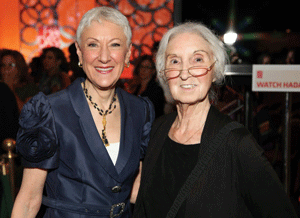
Interactive mini-theater and innovative learning sessions offered insight into Hadassah projects and opportunities for advocacy, from breast cancer fundraisers and “Ridin’ Chai: Texas Motorcycles Ride for Hadassah,” to a forum—run by Zuckerberg—on the future of social media.
The Every Beat Counts initiative, which aims to increase awareness and reduce the incidence of heart disease, was the driving force behind the “Love Your Healthy Heart” panel on Tuesday. Dr. C. Noel Bairey Merz, director of the Barbra Streisand Women’s Heart Center in the Cedars-Sinai Heart Institute in Los Angeles, described the differences between men and women’s heart disease. She outlined five habits associated with a lower risk of heart disease, the primary cause of death in American women: Mediterranean-style nutrition; not smoking; maintaining a body mass index below 25; exercising 30 minutes or more daily; and at least one serving of alcohol daily.
The timeliest plenary, also held on Tuesday, focused on Israel and the Middle East. Gil Troy, research fellow at the Shalom Hartman Institute’s Engaging Israel program and a Young Judaea alumnus, moderated a conversation between Ha’aretz journalist and author Ari Shavit and Bret Stephens, a Wall Street Journal foreign affairs writer and Pulitzer Prize winner. Referring to Israel’s conflict with Hamas, Troy seemed to speak for everyone when he said, “We’re all mourning, we’re all worried, we’re all nervous, we’re all looking for answers.”
Possible answers included changing international opinion of Israel by exposing the tactics of Hamas. Shavit posited that while Hamas shoots rockets at Israel, “their real target is to have their own people killed.
“In this sense, they are different and worse than almost any other entity we know,” using their citizens as shields and storing weapons in areas where an Israeli offensive would ensure collateral damage. He asserted that a proper Israeli public relations strategy would counter reports of Palestinian casualties with the number of Israeli lives saved daily by the Iron Dome defense system.
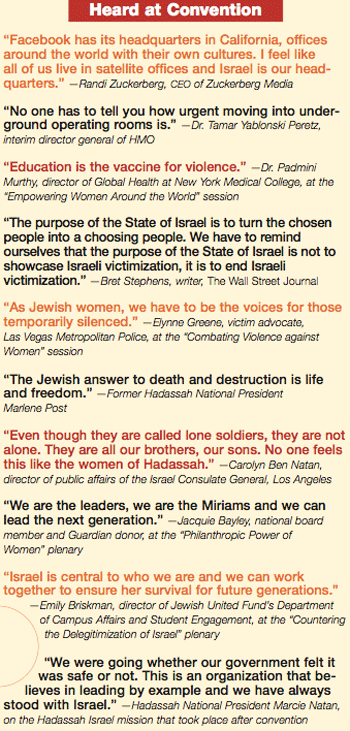 Shavit suggested “the total demilitarization of the Gaza Strip,” giving “the population of Gaza some economic relief so they can have a life—as long as they don’t have rockets.”
Shavit suggested “the total demilitarization of the Gaza Strip,” giving “the population of Gaza some economic relief so they can have a life—as long as they don’t have rockets.”
Stephens wants Hamas’s priorities exposed. “Why,” he wondered, “hasn’t the media asked about the money they spend building tunnels into Egypt and Israel, creating an economy based not on greenhouses, on agriculture, on services, but rockets, mortars, tunnels and training guerillas?
“The only decent or honorable liberalism is pro-Israel liberalism,” Stephens added. “Because to be anti-Israel and to call yourself a liberal is to be either a fool or a hypocrite. It’s to fellow-travel with totalitarianism.”
Stephens proposed reaching out to philo-Semites. Shavit, on the other hand, argued for creating more advocates among progressives by acknowledging Israel’s problems while allowing people to be “involved with whatever Israel you can align with.”
Troy also led two sessions called “Zionism…It’s not a ‘Dirty Word.’” The second, on Wednesday, July 23, attracted so many that conference-center guards turned people away before finally allowing some to sit on the floor and keeping doors open so others could listen from the hallway. Troy discussed the history of the delegitimization movement and observed the irony of European and American “progressives” supporting a fascist, anti-feminist, anti-gay rights group like Hamas.
Troy cited decades of polling data showing that despite negative media coverage, support for Israel remains strong in the United States. “The American people still recognize Israel as a plucky little democracy surrounded by totalitarian states,” he said. But “our intellectuals are our early warning system that tells us what direction education is heading.”
To learn how to handle the anti-Israel lobby, Wednesday’s convention calendar featured “Countering the Delegitimization of Israel,” a forum moderated by Geri Palast, managing director of the Israel Action Network. Speaker David Dabscheck, deputy managing director at IAN, suggested that pro-Israel activists modify their arguments—for example, using the word “Israelis” instead of “Israel” to humanize the conversation; and listening to an opponent’s concerns so as to find a message that will resonate. Lana Melman related how her organization, Creative Community for Peace, educates music and art industry insiders about Israel so they do not fall victim to misinformation and intimidation. Emily Briskman, director of Chicago’s Jewish United Fund Department of Campus Affairs and Student Engagement, spoke about the challenges anti-Israel activity poses for Jewish college students.
The discussion continued at the “Taking Action” forum, where Hadassah Nurses’ Council cochair Rita Lourie recounted her work with IAN last year to avoid a divestment resolution from the American Public Health Association. Exploiting all her connections, Lourie and the IAN swayed members of the APHA by exposing erroneous assertions and demonstrating that the resolution would not accomplish its intended aim of “getting more health care to Gaza.” In the end, 74 percent opposed the measure.
Delegates also got some satisfaction—and relief—from seeing how Israel protects itself in the fictional as well as the real world. NBC News correspondent Jamie Gangel conducted an interview with her husband, Daniel Silva, author of the best-selling international intrigue series featuring Mossad agent Gabriel Allon. The interview included insights—former Presidents Bill Clinton and George W. Bush are fans—as well as background and motivation behind the character who is both a master spy and an art restorer. (For a conversation with Daniel Silva, see page 64.)
Delegates were motivated to help not only in Israel but also at home during the “Be Involved—Social Action/Tikkun Olam” plenary. Abby Leibman, president and CEO of Mazon–A Jewish Response to Hunger, gave the Jewish perspective on poverty and food insecurity. She also explained that there is something more exalted than charity: “Charity meets immediate needs; justice creates long-term solutions.”
Brian Burton, president and CEO of ThreeSquare, a Las Vegas food bank, compared his organization’s work to the cantilever, an architectural element used by Frank Lloyd Wright to project balconies over waterfalls, to “lift up the edge.” “We are all poised to lift up the edge of the people who are suffering,” he said.
Cindy Hallberin, president and CEO of Good360: Goods for the Greater Good, spoke of her organization’s DisasterRecovery360 app and the importance of getting the right goods at the right time. Hallberin recounted how something as seemingly insignificant as a new shirt can help an unemployed person land a job, leading them out of poverty.
“I’m thinking about more local engagement because of the [social action] session,” said Kathy O’Neill, a first-time convention participant from San Antonio, Texas. “What we do matters here in our community, not just in Israel.”
The audience then put their advocacy training into action. A letter circulating through Congress urged the United Nations to consider Gaza’s rockets a barrier to peace and to prioritize their removal. PRAZE Division Coordinator Ellen Hershkin gave instructions on how to email the White House, opposing the F.A.A. ban and supporting the letter. Hundreds of smartphones and tablets appeared, their owners typing away.
Having spent two days learning, it was time for some festivity. And as in all Jewish celebrations, there was reflection and remembrance. At Wednesday night’s closing banquet, The Henrietta Szold Award—Hadassah’s highest honor—was presented to the men and women of HMO for their lifesaving missions abroad, and to the Israel Defense Forces’ Medical Corps. Major Avi Benov, deputy of the IDF’s Trauma and Combat Medicine branch, accepted on behalf of Brigadier General Dr. Yitzhak Kreiss. Like many Israelis at convention, Major Benov had mixed emotions being away from home. “Although I feel privileged to receive this award,” he said, “my heart is with my brothers, my soldiers, in the streets of Gaza.” The speech stirred emotions; he often stopped to compose himself.
Dr. Avi Rivkind, head of hmo’s Shock Trauma Unit, had been present for the convention opening and was scheduled to accept the award for HMO. But as a result of the worsening situation in Israel, he returned before the award ceremony; in his place, HMO Chair Joyce Rabin accepted on behalf of the medical center staff.
Throughout the convention, speakers had offered up-to-the minute reports about the events in Israel and spirits rose at the banquet when Marcie Natan announced that the F.A.A. had lifted its ban, and that a Hadassah solidarity mission was departing for Israel on July 26.
They also rose when Natan reported on the convention fundraising efforts that had begun the night before at the Major Donors dinner and continued at the closing event with traditional pledges and also texted pledges accompanied by messages of tribute—appearing on large screens before the audience—to family members, Israeli soldiers and Hadassah’s hospitals, among others.
The total raised during the convention was $1.5 million. Additional gifts announced during convention were a $1 million sponsorship of one of the Chagall Windows at Hadassah Hospital and a gift from the estate of Patricia Lapan, of Tucson, Arizona, which is expected to provide approximately $20 million over the next 25 years to support nursing scholarships at the Henrietta Szold Hadassah– Hebrew University School of Nursing at HMO.
As Natan spoke, pledges and donation messages continued to appear on the screens behind her. “It was three years ago in Las Vegas that I began my term as president of Hadassah,” she recalled. “When I accepted this great honor, I invoked Abraham’s one-word declaration to God: ‘Hineini.’ I am here. What Abraham meant was that he was ready to fulfill God’s command. For me, it signified my readiness to accept the responsibility of leading Hadassah in fulfilling its mission of building Israel and strengthening the Jewish people. If you are present this evening, your presence speaks for you and says, ‘Hineini.’ You lead by sharing in the joy, the passion and the work of Hadassah.”
The texted and announced pledges ran on for so long that Craig Taubman’s band—the evening’s entertainment—did not appear until almost 11 P.M. Having given of themselves, Hadassah delegates were ready to celebrate, dancing and singing with pride and love.
“Forget the saying ‘What Happens in Vegas Stays in Vegas,’” cochair Marcia Gabrilove Ladin had told delegates at the opening gala. “Take home and share the imagination and inspiration and ignite a spark in every local chapter from coast to coast.” And they did.










 Facebook
Facebook Instagram
Instagram Twitter
Twitter
Leave a Reply